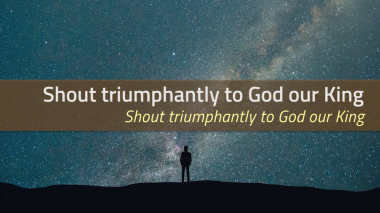‘Here’s the bill’ - Corporate Hospitality

John 10: 11-18
11 ‘I am the good shepherd. The good shepherd lays down his life for the sheep. 12 The hired hand, who is not the shepherd and does not own the sheep, sees the wolf coming and leaves the sheep and runs away—and the wolf snatches them and scatters them. 13 The hired hand runs away because a hired hand does not care for the sheep. 14 I am the good shepherd. I know my own and my own know me, 15 just as the Father knows me and I know the Father. And I lay down my life for the sheep. 16 I have other sheep that do not belong to this fold. I must bring them also, and they will listen to my voice. So there will be one flock, one shepherd. 17 For this reason the Father loves me, because I lay down my life in order to take it up again. 18 No one takes it from me, but I lay it down of my own accord. I have power to lay it down, and I have power to take it up again. I have received this command from my Father.’
This reading contrasts the ‘hired hand’ who cuts and runs at the first sign of trouble with the ‘good shepherd’ who is there through thick and thin and is willing to lay down his life. There are two models of hospitality here - a shallow one and a deep one.
In contemporary Scottish society ‘hospitality’ is something that has become increasingly outsourced, depersonalised, and commodified. ‘Corporate Hospitality’ professionalises welcome and care and puts it in the hands of the specialist ‘hired hands’. As opposed to older, deeper, traditions of hospitality that would welcome a weary traveler just because she was weary (and she might have a story to tell), this relationship centres around money not friendship.
There’s nothing wrong with hotels in themselves - but we lose something when corporate hospitality becomes our only way of picturing hospitality. In many instances corporate hospitality will take exceedingly good care of you (and your credit card) but is nowhere to be seen when the wolf is at the door.
The defining model of hospitality in contemporary society is one of luxury, anonymity and cost to the guest - rather than humility, relationship, and cost to the host. Something crucial happens when it is the guest and not the host that pays. Imagine inviting a friend over for dinner and then asking them to pay for their half of the pork chops? The generosity of providing a meal creates a space where a relationship can change. The itemising of cost - making someone pay for what has been bought - retrenches the relationship.
The host pays without expectation of return and receives something new - a deepening friendship. It is when a host goes ‘above and beyond’ that change can happen. When a host pays there is an opportunity for the boundaries to blur between host and guest, you are becoming part of the family. When the guest pays the roles remain distinct - the relationship is purely transactional.
Host pays = sacrifice = transformation. Guest pays = debt = no change.
Dear God,
Make us gracious hosts
and gracious guests.
Amen.




 Add to Favourites
Add to Favourites








Login to comment.